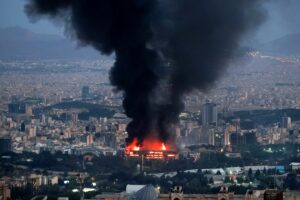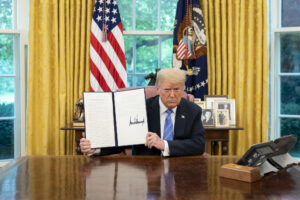The terraces are crowded. By late afternoon, the green spaces are too. Evenings and mornings, commuters create the same traffic jams as everywhere else. Nothing differentiates Kiev from any other European capital and yet everything is different, but what exactly differs?
It was while walking through one of the inner courtyards formed by apartment blocks that I finally understood. Here, only the children laugh. Retreated into seriousness, voices muffled by the war, the adults do not speak. They whisper because even far from the Donbass, where the Russian army has retreated after failing to take Kyiv, no one can forget the incessant deluge of fire that is crushing so many sons, fathers, brothers, lovers and husbands there.
Fourteen hours of travel from the Polish border, the train that took me was full of women who were returning home with their children because they could no longer live elsewhere while their country is being murdered. In Kyiv, no one even hurries up when the sirens announce the launch of missiles that one does not yet know where they will fall. The other day, it hit a train station, killing and injuring dozens of passengers, but Kyiv clenches its teeth and whispers because fatigue, pain and decency forbid it to speak out loud, while the certainty of victory makes it live the life that it wants: a stubbornly, indomitably, furiously normal life.
In fact, I only had one question: “What makes you so sure of your victory?” and, surprised, young and old answer: “But we have no choice! If we should lose, they would kill us and deport us en masse. There would be no more Ukraine and no more Ukrainians either. In the ministries and around the president, the explanation is more political: “We have been at war for eight years, since the annexation of Crimea, eight years that we anticipated this aggression and the Russians had completely underestimated the level of preparation of our forces. By refusing to go into exile and remaining in their posts, the president and the government have both welded the country together in the belief that our victory was possible and now, because they have also convinced themselves that we can win, the world’s democracies are helping us and will continue to do so.”
So there is no point in trying to talk about the terms of the negotiations that will come one day. Negotiation means victory, the withdrawal of the Russians and their withdrawal from the whole of Ukraine. “Crimea included? – Of course with Crimea included. What a question! Isn’t Crimea Ukrainian?
Legally, yes, it is, but it became Russian by annexation and its reconquest would not be obvious, unless a dramatic twist in Moscow, the fall of Putin, and a complete change in the situation… Do you believe in it? No, the Ukrainians don’t believe in it, don’t even think about it, because in their eyes the Russians have tipped over into another world, the evil empire, from which there is nothing more to expect and which must only be contained.
It is not only that Putin has made the most incredible mistake of all in believing he could enter Kyiv in three days. It is also that this aggression and the exactions of his armies have broken all the links between Russia and the other great Slavic and Orthodox people that he wanted to put back under the authority of the Kremlin. So in Kyiv, all you can hear about Russia is that the Ukrainian services are noting that in many regions social discontent is reaching such a degree that the local authorities seem worried.
And that doesn’t give you even higher hopes? No, not really, because Ukraine does not believe or no longer believes in the possibility of a change of course in Moscow even if the deterioration of the economic situation were to bring people to the streets. The Ukrainians believe that the battle will be won in Ukraine and not in Russia, and they are sorely lacking in tanks and anti-aircraft defence systems, the two categories of weapons that the Americans and Europeans are delaying to deliver.
It is not said, but the West would not want to arm Ukraine so well that it could one day launch a recapture of Crimea. I have often tried to come back to this. Wouldn’t it be better for you to be less vague about your objectives and remind people less often that Crimea belongs to you?
Nothing to do. This question has always remained unanswered for the good reason that it is premature. For the moment, the Ukrainians are in the middle of launching the counter-offensive that they have been preparing since the beginning of the summer. The aim is to cut off the Russians from Odessa and block them in the Donbass where they are not making progress. New troops are being trained. New arms deliveries are expected and it is obviously the new balance of power created by this battle that will define the instructions of the Ukrainian negotiators when talks open.
“When will our war end?” a young official asked me. Not until next spring, I replied, and he shrugged: “Not for three or five years”.



